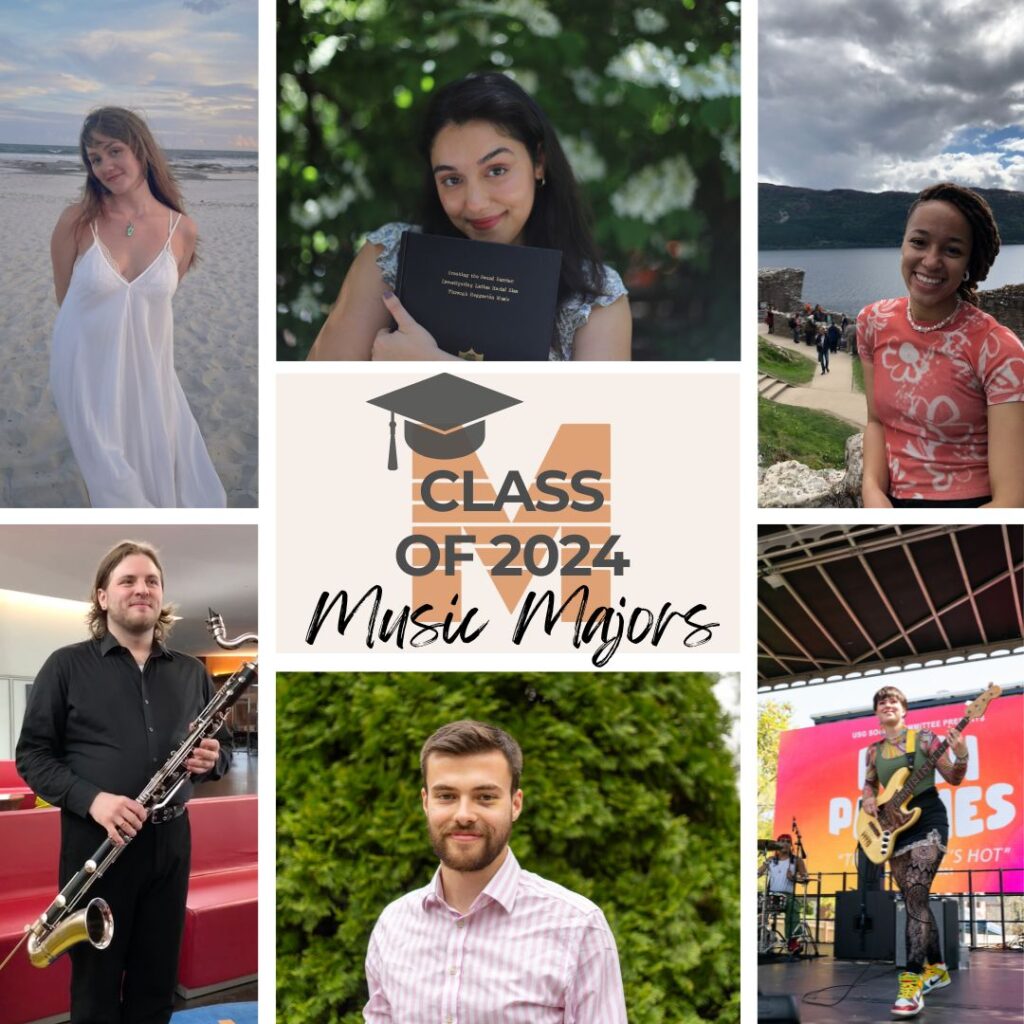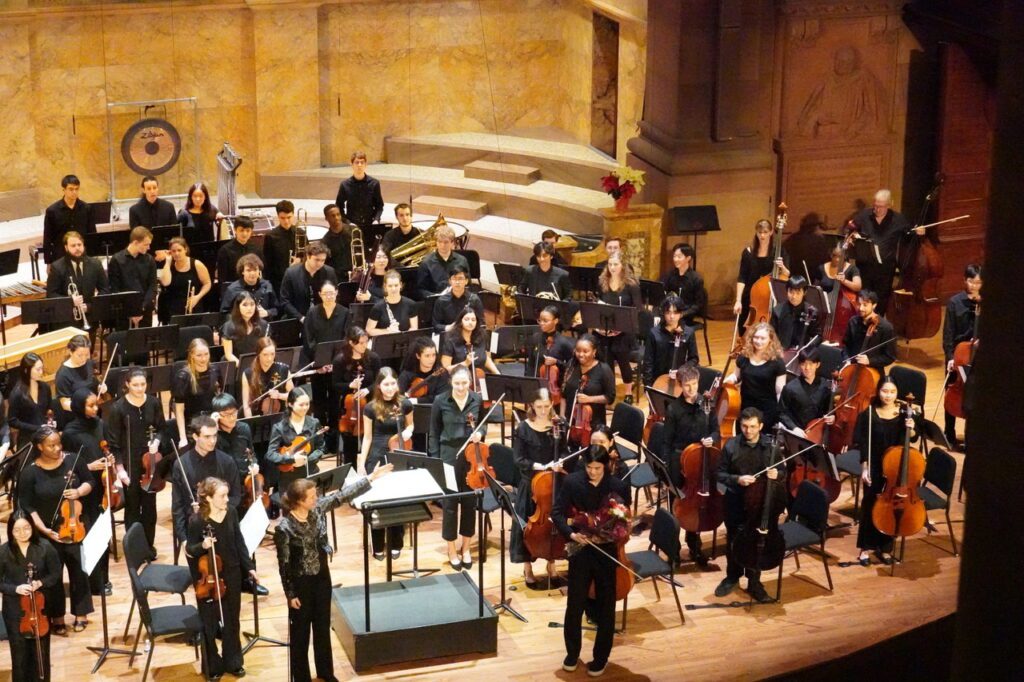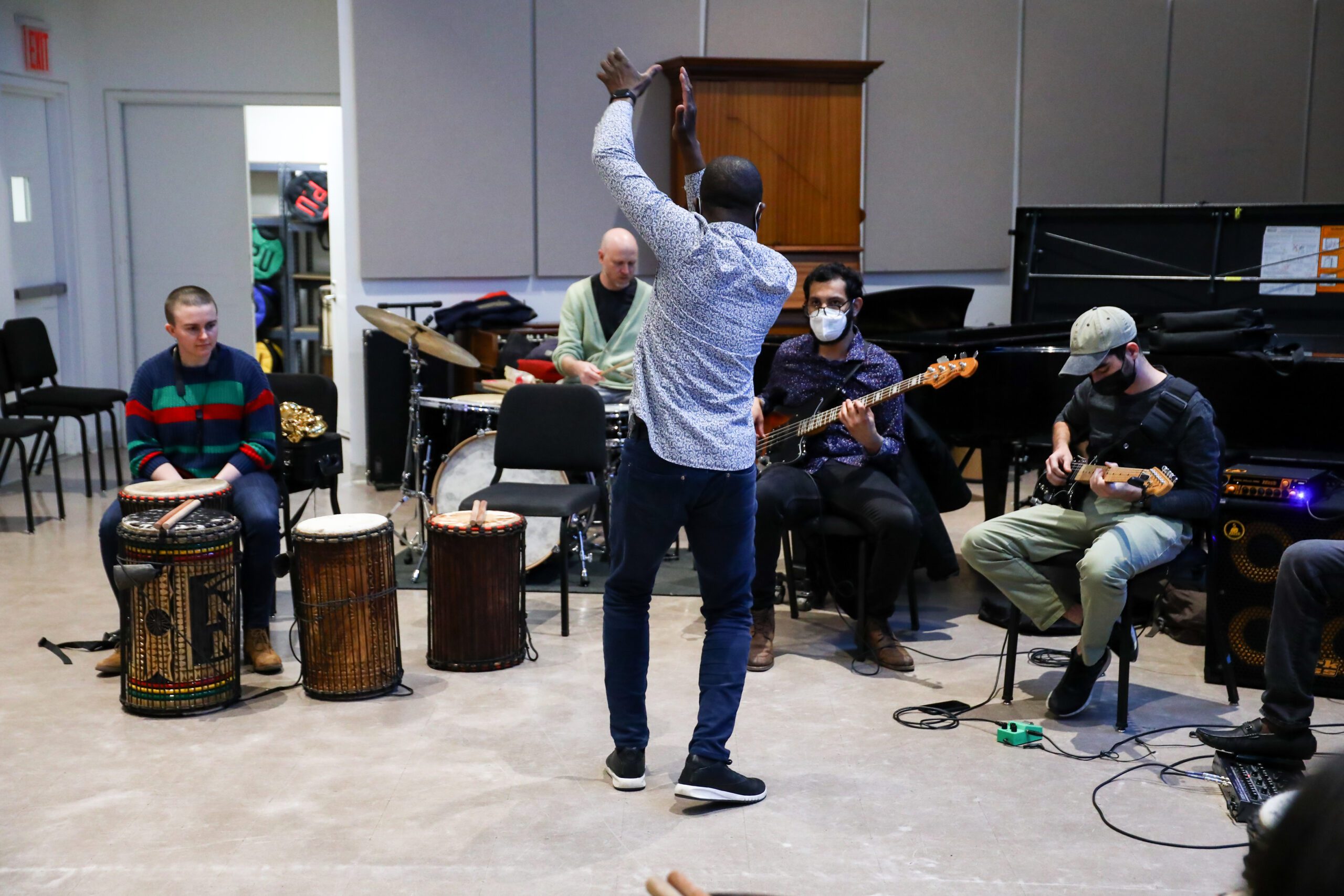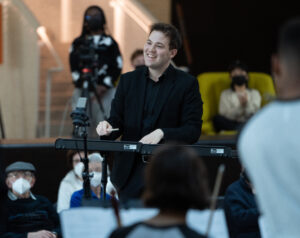On any given weekday in the Princeton Music Department’s two home buildings, the Woolworth and Effron Music Buildings, a multitude of sounds can be heard faintly from behind classroom and rehearsal room doors. Open any one and you’re immersed in conversation and song, drawn in by expert storyteller-educators; throw them all open and a cacophony bursts forth, tracking the development of music around the world and across time.
Spring 22-23 offers a rich breadth of coursework for the experienced musician and the music-curious alike. Students can learn the rhythms and traditions of West African bass drumming from a master practitioner, Music Department professor Olivier Tarpaga; aspiring music ensemble leaders can participate in a lab of creative musical leadership under the guidance of Princeton’s director of the Playhouse Choir and Playhouse Orchestra Solon Snider Sway; and jazz lovers can embark on a soul-enriching survey of jazz’s many sounds and voices with Dr. Matthew Clayton and guests (last year’s class was visited by Cyrus Chestnut, the great jazz pianist).
Some of the coursework parallels that of music departments and conservatories across the Western world: Music in the Renaissance, Music of the Classical Period, Techniques of Conducting, a beginning workshop in musical composition. But unlike in many traditional conservatory settings, the Princeton Music Department coursework expands beyond western idioms.
Rochelle Ellis takes the reins this spring for MPP 214: Projects in Vocal Performance, offered most years but always through the lens of a different subject matter (past years have included Baroque chamber repertoire and Spanish and Latin American song, for example). This semester, Ellis will introduce students to the art songs of the African diaspora, including songs from both living and dead composers based in the United States, Europe, South America, Central America, and Canada. “I’ve been singing for a long, long time. I came up through the regular music conservatory life, and I didn’t know about this music until I was an older adult, singing for a lot of years. I’m excited about the class because I learn just as many new things as the students do” (Ellis).
This spirit of two-way learning – of inspiring and being inspired – suffuses the coursework on offer this spring. Olivier Tarpaga’s performance course in West African bass drumming technique with a focus on Dundun drumming, was inspired by another course he had taught: “The Dundun was not even 10% of that course, but everybody was crazy about it” (Tarpaga). This year will be the second iteration of Dundun Projects, which Tarpaga is intentionally keeping small – capped at about 12 students. The class will enable the kind of flexibility that’s needed when learning the instrument (actually, a family of instruments, including the small Kenkeni, the mid-sized Sangban, and the large Dundunba). In the first half of the semester, students will work on group projects; later, the focus will pivot to solo projects, with the fantastic opportunity to perform on stage with the African Music Ensemble. “My philosophy of African music is that it’s like cooking: we are always leaving space for spices. There are going to be things that are set that I give the students, but then for their assignments, I let them spice it up their own way” (Tarpaga).
Tarpaga will also co-teach MUS 365: Practices and Principles of Rhythm alongside Performers-in-Residence Sō Percussion in the spring, presenting a broader (though far from complete) survey of rhythmic practices stemming from a variety of musical traditions. A primary goal of the instructors is teaching how to hear and work in layers – how to feel multiple rhythmic ideas simultaneously, so that whether a student is conducting the odd-time rhythms of Bulgaria, playing the intricate rhythms of Trinidad, or just working through their own repertoire, there is a sense of broadened perspective, of richer musical palette. “I’m excited for students to have the opportunity to bring in their own creative ideas in a safe and supportive environment. To build this into a theory and practice course is pretty special – it’s pretty fun” (Jason Treuting).
The spring semester also features a number of cross-listed courses, which position music within the broader cultural and political context. Matthew Clayton’s upcoming course on jazz history, subtitled “Many Sounds, Many Voices,” is cross-listed in the African American Studies department. “There’s not really one jazz sound; ‘jazz’ is kind of a catch-all term for a multiplicity of sounds and approaches to music” (Clayton). In the course, students will journey through the evolution of jazz, from Scott Joplin to Charlie Parker to Coltrane to jazz fusion and the music of today. There’s also Maya Kronfeld’s course, Conversations: Jazz and Literature, which invites students to explore literature’s response to blues and jazz and music’s response to literature across a variety of periods. Kronfeld is in the Society of Fellows in the Liberal Arts, so an interdisciplinary approach is just her style. “I’m a scholar of comparative literature, but a lot of my research is in jazz studies, and I have a second career as a professional jazz pianist. So this course is really an opportunity for me to bring the two sides of my profile together, but also to invite some of my collaborators from my performance life into the classroom” (Kronfeld).
And Rubén Gallo’s upcoming Opera: Culture and Politics course will enable a similar close-reading of the opera canon, as students delve into the cultural and political ideas that opera has sparked over the past two hundred plus years: stereotypes of Spain in Bizet’s Carmen, European colonialism in Verdi’s Aida, and the question of antisemitism in Wagner’s Die Meistersinger. “I teach a Global Seminar in Vienna, one of the musical capitals of the world, and every summer I take the students to the opera. What I’ve found over the years is that the students are just blown away. So I thought, well, maybe I should try to do something like this at Princeton. It’s not a course that really focuses on the music itself, but rather on the cultural debates” (Gallo).
Of course, some cultural debates in recent years have become so polarized so as to halt discourse entirely. Barbara White’s course, Cultural Appropriation in the Arts, aims to create space for nuanced discussions around the complex cultural and socio-political dynamics of art-making. “In the last 8-10 years, in almost every course that I’ve taught some of the material would bring up issues of cultural crossing and hybridity. What I really want in the course is to find a space to discuss these topics more in depth, so we take an analytical approach” (White). One of the artworks to be studied is the 1992 Aladdin. “Many students have seen the movie and often have youthful memories of it, but then they see it again and think about what sorts of tropes are in the film.” White’s lecture on Aladdin journeys back to films from the ’20s that, like Aladdin, also take The Book of One Thousand and One Nights as their basis to enable discourse into a broader historical context. The syllabus will also cover opera, music video, literature, visual art, and even social media mediums like TikToks in a part-lecture, part-discussion format.
There are a number of composition courses on offer in spring 22-23. Princeton University Arts Fellow Kamara Thomas’ Songwriting and Musical Storytelling course takes a multidisciplinary, story-based approach to her fall 22-23 songwriting course. “I’m really interested in songwriting around the history of place and around ecology and nature – songwriting that isn’t as overtly personal, because ‘myself’ is always going to make it into the song in some way – really finding imaginative landscapes and places and stories and characters and things to respond to in our songwriting” (Thomas). Students will use Thomas’ work-in-progress, Tularosa: An American Dreamtime, based on the Tularosa region of land in New Mexico, as a springboard for discussions around archival research and then dig into their own chosen histories to create a unique musical storytelling work.
New music faculty member Tyondai Braxton is looking forward to sharing his take on electronic music in Computer and Electronic Music through Programming, Performance, and Composition: “A bunch of teachers have taught this course over the years, customizing it and giving it a very personalized approach. I’m excited to have my hand in that – to set up a series of scenarios to have the students react to and to set up different situations that could hopefully help people realize creative practice within this area of electronic music” (Braxton). The course will marry frequent listening and discussion with compositional responses: students will utilize the very practices at play in the canon of electronic music to create their own work. “The story is still being written with electronic music in a lot of ways. In this class, students can have their hands on the knobs and really feel what it means to work in this way, as opposed to this just being some theoretical class. I’m looking for students who are open minded and exploratory and who understand that there are still creative paths that have yet to be walked down in electronic music” (Braxton).
And with a vibrant array of faculty- and student-led musical ensembles across the campus community and numerous alumni in prominent musical leadership roles, it is only fitting that the Music Department inaugurate a new course geared at leading ensembles. “MTD 404/MUS 404: Creative Musical Leadership is a course that I developed in conjunction with Gabriel Crouch and Stacy Wolf and Jane Cox. We wanted to create a space for students who are interested in becoming musical leaders to cultivate different types of skills where they’re looking at big questions of what does it mean to create or lead an ensemble” (Snider Sway). Students can expect a fast-paced course that includes in-depth ensemble case studies, practical score study and rehearsal strategy skill-building, a rehearsal lab component, behind-the-scenes opportunities with campus’ various music ensembles, and a final project that gives students the resources to create and lead a custom ensemble.
There’s also, of course, a wide variety of coursework beyond the ones mentioned herein. There’s Elizabeth Margulis’ Music Cognition course, cross-listed with the Psychology Department, Rudresh Mahanthappa & Dmitri Tymoczko’s Composition and Improvisation course, Gavin Steingo’s course on Sound Cultures, and so much more. To explore the full listing of spring 22-23 coursework, please visit registrar.princeton.edu/course-offerings.
In Other News

What Six Senior Music Majors’ Say About Their Theses
May 16, 2024
As we near the final weeks of spring semester and anticipated graduation for the Class of 2024, the Music Department asked six Senior Music Majors to expand on their creative thesis, as well as share words of encouragement to future students.

What Actually Happens At An Academic Music Conference?
Feb 1, 2024
Every November, thousands of music theorists and musicologists descend upon the vast ballrooms of America’s metropolitan convention hotels for their annual academic society meeting. This past November, the American Musicological Society (AMS), which celebrates its ninetieth annual meeting in 2024, and Society for Music Theory (SMT) held their joint conference in the Mile-High City of Denver, Colorado.

Student Perspectives: The Musical Odyssey of Princeton’s Adrian Thananopavarn
Jan 18, 2024
Adrian P. Thananopavarn ’24, Math major with certificates in Computer Science and Music Composition, premieres “March of Dusk” with Princeton University Sinfonia


